
How Did France Change During the French Revolution?
Blog by
Last updated: Thursday February 1st, 2024
Report this blog
Last updated: Thursday February 1st, 2024
Report this blog
+4
Quick Links
This blog shall provide an academic overview of the transformations - mostly political - occurring in France from 1789 to 1799 as a consequence of the French Revolution. It is chiefly intended for college students due to the intricate information provided and the high level of vocabulary.
For ease of learning, I have provided some hyperlinks to Encyclopedia Britannica or other relevant websites for certain specific terms or events not covered in detail in this article.
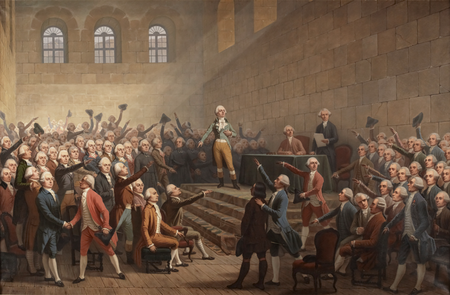
The Estates-General of 1789: the first attempt at political reform favouring common folk in France
Overview
The final decade of the eighteenth century was arguably the most transformative in French history; in ten years, the nation transitioned from an absolute monarchy to the most liberal republic in Europe. The first, and most fierce, populist revolution in 1789 led to a change in administration to a representative democracy, then an immoderate dictatorship, then an inept Directory, and ultimately culminated in a coup giving rise to Napoleon Bonaparte in 1799.
Constitutional Development
The year 1789 was characterised by the ascendancy of the National Assembly, sparking France’s constitutional development. On 20th May, the National Assembly: a group of predominantly Third Estate members, took the Tennis Court Oath, illegally establishing them as France’s governing body – gradually receding the 'ancien régime'. This inspired ordinary folk to protest – mainly violently – the monarchy; the killing of Bastille governor Bernard-Réne de Launay and the Women’s March on Versailles exemplify this.
To safeguard individual liberties and social and political equality, the August Decrees were issued in August 1789 – abolishing the feudal and estate systems and any financial or hierarchical privileges, as well as freeing the individual from subjection to a lord or monarch. These nineteen articles preceded the first French constitution: ‘Le Déclaration des Droits de l’Homme et du Citoyen’ guaranteeing “liberty, property, safety and resistance against oppression” to every ‘man’. The Constitution of 1791 mandated these liberties and granted those political – such as voting rights – to ‘active citizens’; it also firmly checked King Louis XVI’s authority, establishing France as a constitutional monarchy. Furthermore, the Civil Constitution of the Clergy forced the subordination of the clergy to the State, banned monastic vows and provoked mass dechristianisation, attenuating France’s relations to the Catholic Church.
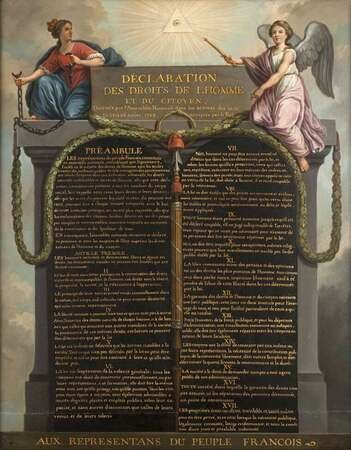
An artistic portrayal of le Déclaration des Droits de l'Homme et du Citoyen: the first French constitution
The Reign of Terror
The founding of the First French Republic in 1792 gave rise to the left-wing members of the Jacobin Club, fomenting the Reign of Terror. The storming of the Tuileries Palace on the 10th of August led to the monarchy being abolished, invariably radicalising the revolution. As such, a new constituent assembly, the National Convention, was created. A divide between the Montagnards (a left-wing faction of the Jacobins) and the more moderate (although initially syncretic) Girondins emerged, but the latter’s presence dissipated following their reluctance to support economic and political reforms for the ‘sans-culottes’. This allowed Maximilien Robespierre to centralise authority under the Committee of Public Safety, effectively becoming a dictator.
A slew of inordinate, and mostly sanguinary, measures to effect his radical ideals followed: the abrogation of the clergy replaced by the Cult of the Supreme Being, extensive policing to detect purported opponents of the Revolution under the Law of Suspects, and the mass execution of suspected ‘traitors’ and political opponents, such as Marie Antoinette. Consequently, a counterrevolution by royalists, Christians and Girondins broke out, as seen in the War in the Vendée. As fears of a mass purge rose, the Coup of 9 Thermidor was initiated, resulting in the demise of the Jacobin Club and the Reign of Terror.
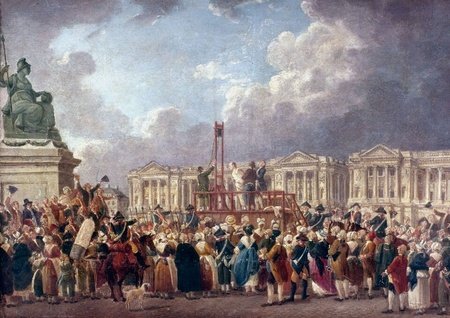
The September Massacres: mass executions of prisoners over mass paranoia and civil unrest - a precursor for the Terror
The Thermidorian Reaction and Rise of Napoleon
The ineffective rule of the Directory and war campaigns leading to the Treaty of Campo Formio precipitated Napoleon Bonaparte’s rise as First Consul of France. Following the rampant violence and extremism of the Terror, a conservative reaction motivated by a desire for a moderate government – dubbed the ‘Thermidorian Reaction’ – commanded French politics. However, civil unrest persisted due to the purge of Jacobins (the White Terror) and protests countering the repeal of the General Maximum controlling food prices. Royalists were also discontent with the moderate government, and organised a coup to overthrow the National Convention in 1795: 13 Vendémiaire. The uprising was quelled, especially by Napoleon, who had acquired a favourable reputation among French citizens.
Moreover, the bicameral Directory was proclaimed under the Constitution of Year III. Its inefficiency in legislating and governing was guaranteed by its vast division of power. Since 1792, France had been engaged in conflict with other absolute monarchies (and Great Britain) to propagate its revolutionary ideals. Hence, the nation oversaw a territorial expansion to the Austrian Netherlands and Nice with the War of the First Coalition. In 1796, the Italian campaign against Austria – spearheaded by Napoleon – was successfully concluded. The subsequent Treaty of Campo Formio ceded many Austrian lands to France, enhancing the general’s popularity. Combined with the ineptitude and corruption of the Directory, the government was overthrown in the 1799 Coup of 18 Brumaire, establishing the Consulate headed by Napoleon, who would rule as a dictator. This marked the end of the French Revolution.
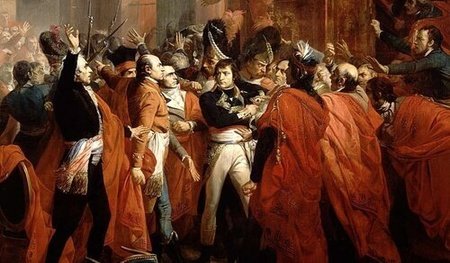
Napoleon in the Directory during the Coup of 18 Brumaire, which ended the French Revolution
Conclusion
Whilst the decade from 1789 to 1799 morphed France’s politics from absolute monarchism to democratic republicanism, the nation merely transitioned from a despot (the King) to another despot (Napoleon), with multiple turbulent changes in government in between. The old conservative, ultra-religious rule had been undermined by constitutional development, popular sovereignty and free elections, but these alterations were more abstract than concrete. Despite such a surge in liberalism and populism, the vast majority of French citizens remained impoverished and underrepresented.
Further Reading
- Overview of the Causes of the French Revolution
- Events of 1789
- The Declaration of the Rights of Man and of the Citizen
- Constitutional Monarchy
- The First French Republic
- The Jacobins
- The Reign of Terror
- The Thermidorian Reaction
- The Directory
- The French Revolutionary Wars
- The Coup of 18 Brumaire
- A Biography of Napoleon
- My First Blog Detailing the French Revolution
- My Second Blog Detailing the French Revolution
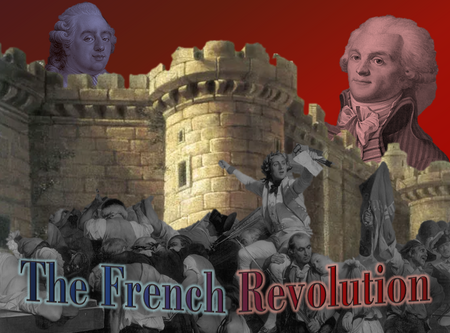
This blog is part of a set concerning the FRENCH REVOLUTION. The rest can be accessed from my History series, listed consecutively as the first category of blogs.

Whilst I am not officially qualified to give information, everything I publish on this site is checked by my tutors, and I make sure to conduct a lot of independent research. So, you can trust the information in my blogs, but I would recommend you check other sources.
Apologies if I disappointed you, but I will certainly create blogs on the Concert of Europe in the near future, so maybe those would be of assistance.